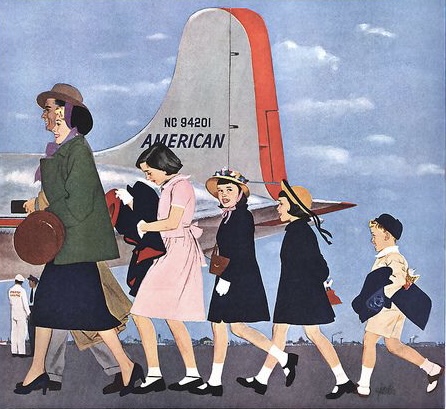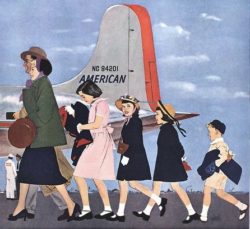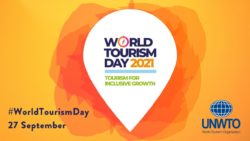Tourism for everyone? Inclusivity in today’s travel market

In this post, Marta Soligo* argues for a critical re-evaluation of global tourism to make it more accessible to racial minorities, people with disabilities and countries in the global South.
EXPLAINING the history of leisure in Western countries, scholars often define the post-World War II economic boom as a game-changing phenomenon. A key term in this sense is “democratization”, with experts highlighting that starting from the 1950s, leisure ceased to be a privilege of the wealthy. Factors such as an improvement in working conditions, higher salaries, and paid vacations extended the pleasures of free time to new layers of society. Quickly, the working class adopted the middle-class standards of living, becoming the new protagonist of recreational activities. This was in stark contrast with the elitist leisure class described by Thorstein Veblen more than half of a century earlier. During the post-war boom, the underlying “leisure for everyone” motto gave the euphoric illusion that accessibility inequities were just a fading memory.

Credits: James Vaughan, Pinterest/Flickr
Being one of the most important leisure subsectors, tourism followed a similar path. Together with cars, washing machines, and TVs, the booming working class started adding trips and vacations to its shopping lists. Thus, with larger strata of the population being able to book resort stays or fly internationally, tourism looked more accessible than ever. However, talking about this point during my Sociology of Leisure and Tourism class, I always feel the need to project a slide that reads, “Leisure for everyone?”, where the question mark occupies a good section of the screen. As I like to tell my students, the fights undertaken in the past century to obtain more flexible (and human) working schedules and the right to free time represented a fundamental milestone. However, tourism scholars know that accessibility and inclusivity issues within the travel industry never stopped existing, being heavily present today as well.
In the past few years, the amount of academic research on tourism and social problems - such as poverty, racism, and gender inequality - has experienced exponential growth. Social scientists are increasingly interested in explaining how much the concept of universally accessible leisure and tourism diverge from reality. One of the main criticisms is that scholars have been focusing on Western tourism and tourists for way too long. This created a situation in which tourism literature has often ignored minorities' experiences.
The predominant scholarship on white travellers, for example, has created a progressively conspicuous imbalance. The several studies on race and tourism that came out in the past few years revealed the importance of investigating the experiences of people of colour. Insightful in this sense is the book Driving While Black by G. Sorin, which shows how, throughout history, African Americans’ travel experiences have been (and still are) filled with challenges rooted in discrimination. Similarly, a thorough overview comes from an article by A.K. Harrison, who investigated the concept of exclusionary geographies by analyzing whiteness and racial spatiality in ski attractions.
Another heated debate relating to inclusivity is architectonic barriers, which too many times have made “accessible tourism” sounds like an oxymoron. Numerous scholars are aware of the endless issues that people with disabilities face while travelling and have made efforts to raise awareness on the topic. In a recent study on the Gargano National Park (Italy), E. Sica et al. found that responsible and accessible tourism in natural attractions “risk to remain empty concepts, if not duly operationalized” (p. 9). Additionally, experts urge stakeholders to rethink accessibility using new technologies. A 2020 investigation by a group of scholars from the Transilvania University of Braşov showed that virtual and augmented reality might enhance accessibility for travellers with disabilities in the travel planning and exploration phases (Epuran et al.). As the above-mentioned experts point out, it is important to push for regulations and solutions that can stimulate the development of more welcoming destinations for racial minorities and people with disabilities who presently experience discrimination.
Moreover, the asymmetry between tourism-generating “metropolitan” countries and tourism-receiving peripheral nations highlighted by sociologist E. Cohen thirty years ago is still visible. For several communities, especially in the global South, tourism does not represent a pleasant activity. For some, the travel sector is an exploitative phenomenon that exacerbates inequalities and power imbalances. Thus, it is important to take a step further and welcome those trends in scholarship that look, for example, at the global South. This is fundamental in the post-pandemic recovery, which disproportionately affected tourism destinations worldwide.

Source: UNWTO
It is not a coincidence that on September 27 this year, the World Tourism Organization (UNWTO) dedicated World Tourism Day to the topic of tourism and inclusive growth. As Siandou Fofana, Minister of Tourism and Leisure of Côte d'Ivoire - where the World Tourism Day ceremony was held - highlighted, tourism can be a significant tool to fight against poverty. Thus, it can promote the social and economic inclusion of vulnerable groups, especially thanks to the sector’s transversality and job-creation capacity. Moreover, through the words of Leila Farah Mokaddem from the African Development Bank, UNWTO highlighted tourism’s ability to foster a sense of cultural exchange between foreigners and citizens.
During World Tourism Day, UNWTO declared that the massive social and economic impacts of COVID-19 revealed that marginalized groups and the most vulnerable have been hit hardest. Discussing recovery strategies within the travel market, the agency expressed the need for measures that can guarantee a comprehensive and fair distribution of the benefits. A key issue here is vaccine inequity, with UNWTO denouncing how the asymmetric roll-out of vaccines magnified the economic blow tourism has suffered in developing countries.
Tourism is a global phenomenon and, to be a successfully inclusive sector, its stakeholders should prioritize universal accessibility. During COVID-19, the travel market experienced a difficult hiatus, and the consequences are likely to remain for decades. The pandemic-related crisis exacerbated and exposed issues that were present well before February 2020. The next few months will be crucial in establishing the recovery paths for destinations worldwide. Therefore, it is necessary to include in planners’ vocabularies terms such as inclusivity, accessibility, and sustainability for both tourists and local communities. The hope is that the motto “leisure for everyone” ceases to be a 1950 dream and starts to be a reality.
* Marta Soligo works as a Postdoctoral Research Faculty for the International Gaming Institute at the University of Nevada, Las Vegas (UNLV), where she teaches Sociology of Leisure. She is also a Visiting Professor of Sociology of Tourism at the Università Degli Studi di Bergamo (Italy), for the master’s course in Planning and Management of Tourism Systems. She can be reached at: soligo@unlv.nevada.edu
Works cited
Cohen, E. 1984. "The Sociology of Tourism: Approaches, Issues, And Findings." Annual Review of Sociology 10(1):373-392.
Epuran, Gheorghe, Alina Simona Tecău, Cristinel Petrișor Constantin, Bianca Tescașiu, and Ioana Bianca Chițu. 2020. "Opportunities of Using New Technologies (VR/AR) in order to Facilitate the Access of Persons with Disabilities to Tourist Products." Series V - Economic Sciences 13(62)(2):55-64.
Harrison, Anthony Kwame. 2013. "Black Skiing, Everyday Racism, and the Racial Spatiality of Whiteness." Journal of Sport and Social Issues 37(4):315-339.
Sica, Edgardo, Roberta Sisto, Piervito Bianchi, and Giulio Cappelletti. 2020. "Inclusivity and Responsible Tourism: Designing A Trademark for A National Park Area." Sustainability 13(1):13.
Sorin, Gretchen Sullivan. 2020. Driving While Black: African American Travel and The Road to Civil Rights. New York; London: Liveright Publishing Corporation.
UNWTO. 2021. "Global Economy Could Lose Over $4 Trillion Due To COVID-19 Impact on Tourism." Unwto.org. Retrieved November 28, 2021 (https://www.unwto.org/news/global-economy-could-lose-over-4-trillion-due-to-covid-19-impact-on-tourism).
UNWTO. 2021. "World Tourism Day 2021: Tourism for Inclusive Growth." Unwto.org. Retrieved November 28, 2021 (https://www.unwto.org/wtd2021).
Veblen, Thorstein. 2019. The Theory of The Leisure Class. London: Forgotten Books.
